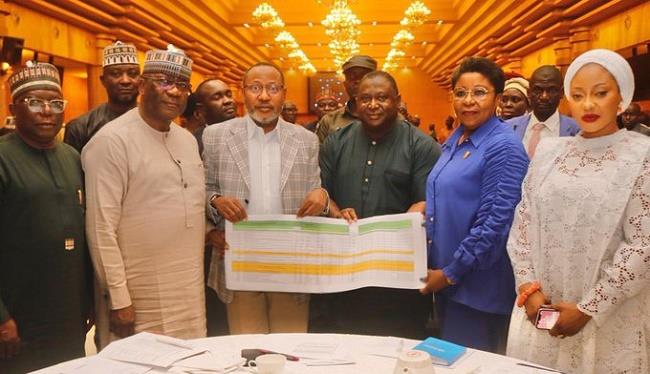Minister of Environment Balarabe Lawal inaugurated the 50×2030 survey initiative, a collaborative effort between the World Bank and FAO, geared towards enhancing global agricultural and climate statistics to bolster food security.
The initiative was unveiled during a workshop hosted by the Agro-Climatic Resilience in Semi-Arid Landscapes (ACReSAL) project, in partnership with the World Bank, on Thursday.
Lawal underscored the pivotal aims of the 50×2030 initiative, emphasizing its mission to fill agricultural data voids and advocate for informed decision-making through the establishment of a robust, integrated, and sustainable agricultural survey program.
Expressing confidence in the initiative’s potential, Lawal highlighted its significance in addressing the nation’s data requirements and cultivating a culture of data utilization in decision-making processes.
The 50×2030 Initiative, led by the World Bank and FAO, aims to address data gaps, bolster national statistical systems, and advocate for evidence-based agricultural practices across 50 low, lower-middle, and middle-income countries by 2030.
“In Nigeria, the 50×2030 Initiative will collaborate closely with the ACReSAL team, the Ministry of Environment, the Ministry of Agriculture, and the National Bureau of Statistics (NBS) to develop and execute climate and agriculture-focused survey programs across all 36 states and the Federal Capital Territory (FCT).
“These surveys will include an ACReSAL-specific module to monitor progress and inform decision-making. The data collected through these survey programs will guide national policies and programming in the agriculture sector, as well as inform climate change policies,” the minister stated.
Abdulhamid Umar, National Project Coordinator of the ACReSAL Project, highlighted that the program encompasses 50 countries, members of the World Bank.
“The initiative aims to enhance the capacity of these nations to gather reliable data from agricultural sites, thereby ensuring food security. The project also aims to extend its reach to all 36 states and the FCT,” Umar added.
Vinay Vutukuru, Social Development Leader at the World Bank, emphasized that the project aims to tackle the challenges posed by climate change and food insecurity in Nigeria through data-driven agricultural strategies.
Koffy Kouacou Dominque, the Food and Agriculture Organization of the United Nations (FAO) Representative in Nigeria and to ECOWAS, highlighted the objectives of the 50×2030 Survey, which aims to bridge the agricultural data gap and establish robust national data systems to generate and utilize high-quality, timely agricultural survey data in Nigeria.
Representing Dominque, Tofiq Braimah, an FAO Officer, reiterated FAO’s commitment to supporting capacity-building efforts at the national level to ensure the sustainable production of agricultural statistics in Nigeria.
“This collaborative effort will empower the National Bureau of Statistics and the Ministry of Agriculture and Food Security to spearhead data production, ensuring the continuity of technical assistance provided under the 50×2030 initiative,” Braimah explained.
He further outlined that through this partnership, essential agricultural variables such as income, labor productivity, production methods, environmental impact, and machinery usage will be regularly collected to provide valuable insights into the agricultural sector.
Braimah also announced FAO’s commitment, in collaboration with the World Bank, to support the implementation of annual agricultural surveys in Nigeria over the next five years, as part of the 50×2030 approach.
Senator Aliyu Abdullahi, Minister of State for Agriculture and Food Security, represented by Mr. Oshadiya Olanipekun, Director of Lands and Climate Management Services, commended the World Bank for its initiative, highlighting its potential to unlock the agricultural sector’s capabilities and stimulate economic growth.
Yemi Adeniran, the Statistician General of the Federation and CEO of the NBS, emphasized that the launch of this initiative marks the beginning of a significant partnership between ACReSAL and NBS, facilitating the generation of agriculture and climate-related data in Nigeria until 2030.





